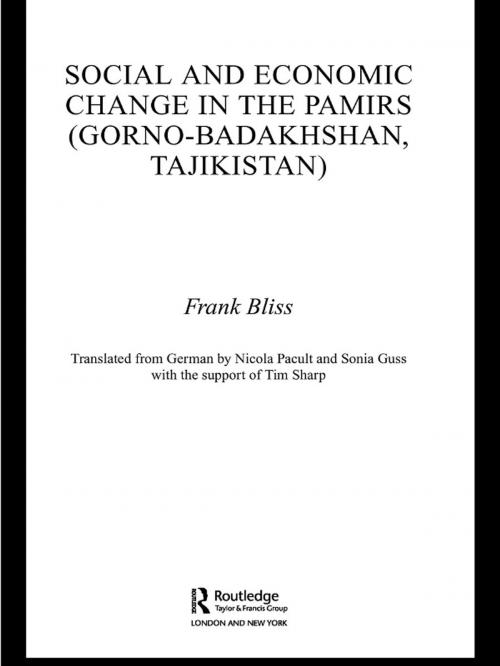Social and Economic Change in the Pamirs (Gorno-Badakhshan, Tajikistan)
Translated from German by Nicola Pacult and Sonia Guss with support of Tim Sharp
Nonfiction, Social & Cultural Studies, Social Science, Cultural Studies, Ethnic Studies, Sociology, Business & Finance, Economics| Author: | Frank Bliss | ISBN: | 9781134396160 |
| Publisher: | Taylor and Francis | Publication: | May 2, 2006 |
| Imprint: | Routledge | Language: | English |
| Author: | Frank Bliss |
| ISBN: | 9781134396160 |
| Publisher: | Taylor and Francis |
| Publication: | May 2, 2006 |
| Imprint: | Routledge |
| Language: | English |
Since Olufsen and Schulz published their monographs on the Pamirs in 1904 and 1914, respectively, this is the first book to deal with the history, anthropology and recent social and economic development of the Pamiri people in Gorno-Badakhshan, Eastern Tajikistan. After the collapse of the Soviet Union, such high mountain areas were more or less forgotten and people would have suffered severely from their isolation if an Aga Khan Foundation project in 1993 to 1994 had not afforded broader support. The reader will be confronted by an almost surrealistic world: Pamiri income and living conditions after 1991 dropped to the level of a poor Sahelian country. Former scientists, university professors and engineers found themselves using ox-ploughs to plant potatoes and wheat for survival. On the other hand, 100% literacy and excellent skills proved to be an enormous human capital resource for economic recovery. The first sign of this was an increase in agricultural production, something that had never occurred during Soviet times.
Since Olufsen and Schulz published their monographs on the Pamirs in 1904 and 1914, respectively, this is the first book to deal with the history, anthropology and recent social and economic development of the Pamiri people in Gorno-Badakhshan, Eastern Tajikistan. After the collapse of the Soviet Union, such high mountain areas were more or less forgotten and people would have suffered severely from their isolation if an Aga Khan Foundation project in 1993 to 1994 had not afforded broader support. The reader will be confronted by an almost surrealistic world: Pamiri income and living conditions after 1991 dropped to the level of a poor Sahelian country. Former scientists, university professors and engineers found themselves using ox-ploughs to plant potatoes and wheat for survival. On the other hand, 100% literacy and excellent skills proved to be an enormous human capital resource for economic recovery. The first sign of this was an increase in agricultural production, something that had never occurred during Soviet times.















